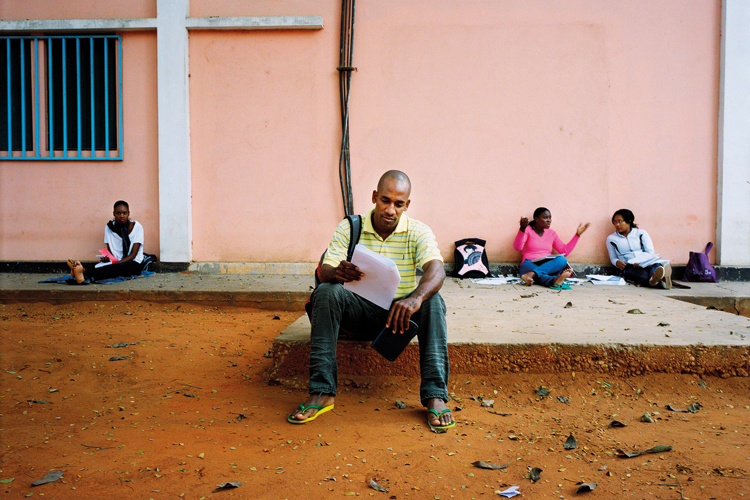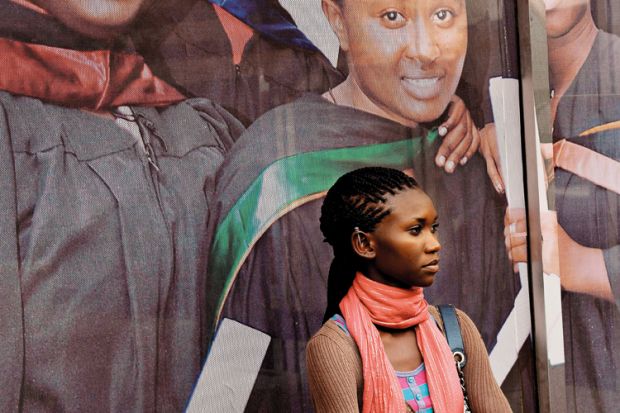In the expansion of higher education, the establishment of private, for-profit universities has become “almost a defining principle”.
So says Adebayo Olukoshi, director of the United Nations’ African Institute for Economic Development and Planning, who warned that the growth of the private sector was eroding universities’ role in the advancement of the continent when he addressed the inaugural Times Higher Education Africa Universities Summit in Johannesburg earlier this year.
The essence of the university, Olukoshi argued, “rests more in the promotion of public purpose and not of private gain”, and rediscovering this mission will enable higher education to reclaim its rightful role in “the mobilisation of the citizenship which we require for the renaissance of the continent”.
Are these concerns justified? Has the private sector become too prevalent in sub-Saharan higher education? Are standards too poor, and governments too weak to regulate? And can universities that focus on the individual rather than the societal benefits of higher education contribute to the development that the continent so desperately needs?
One thing that is certain is that there has been huge expansion of private provision of higher education in sub-Saharan Africa during the past 25 years.
In the aftermath of colonialism, the development of higher education was characterised by publicly funded national universities. However, while the number of public universities in the region doubled from approximately 100 to nearly 200 between 1990 and 2007, the rate of growth in the private sector in recent decades has been much faster. According to the 2009 World Bank report Accelerating Catch-up: Tertiary Education for Growth in Sub-Saharan Africa, the number of private universities and colleges, including for-profit and not-for-profit institutions, mushroomed from 24 to an estimated 468 over the same period.
More than half (53 per cent), it estimates, are found in francophone countries, with the largest numbers of institutions found in Senegal (41) and the Democratic Republic of Congo (39). About a third (34 per cent) are in anglophone countries, with 79 in South Africa alone.
The proportion of African undergraduates being educated in private universities has also increased. But since the majority of these institutions have fewer than 1,000 students, public universities are still in the lead on this measure.
The World Bank estimates that private enrolments account for 24 per cent of all tertiary enrolments in the region: 19 per cent in francophone countries, and 32 per cent in anglophone countries.
Jonathan Mba, director of research and academic planning at the Association of African Universities, attributes the rapid expansion of private higher education to the inability of governments and public universities to provide higher education places for a population that is growing quickly and includes an emerging middle class.
“Some years back, universities were few and people looking for education at a high level were few, but now demographics are coming into play,” Mba says. “More people are coming on board but [existing] universities are not expanding in a manner commensurate with demand for education.”
This increase in demand shows little sign of slowing. A separate World Bank report, Financing Higher Education in Africa (2010), predicts that the total number of students across Africa could reach between 18 and 20 million this year, up from 9.3 million in 2006, and 2.7 million in 1991.
There are other reasons for the expansion of private higher education in sub-Saharan Africa. Many private universities have been established by religious groups, particularly Christian churches, and these tend to be run on a not-for-profit basis. Character-building and promoting religious values are more important than making money for these institutions, which are very numerous in some countries. Daniel Levy, director of the Program for Research on Private Higher Education, based at the State University of New York Albany, estimates that religious universities account for four out of every five Kenyan private universities and two-thirds of private Nigerian institutions.
In addition, while public universities tend to remain more prestigious – all nine of the African universities that appear in the Times Higher Education World University Rankings 2015-2016 are public – complaints that their courses do not prepare students for the demands of industry are common.
Graduate unemployment is a significant problem across the region, with a British Council report published last year estimating that nearly a quarter of Nigerian graduates of working age were not in a job. It takes five years on average for a Kenyan graduate to secure a job, according to the report, Can Higher Education Solve Africa’s Job Crisis? Understanding Graduate Employability in Sub-Saharan Africa.
Many researchers argue that this is where private universities can play an important role, offering courses tailored to the demands of industries, in subjects such as business management, accounting, computer science and economics. Some private universities also have strong links with Western institutions, offering the opportunity to study or work overseas, which can make the qualifications that they offer more attractive.
N. V. Varghese, director of the Centre for Policy Research in Higher Education at New Delhi’s National University of Educational Planning and Administration, studied the reasons for the growth of private universities while he held a series of senior roles at the United Nations-established International Institute for Educational Planning until 2013. He says the public sector does not supply the skills that employers want. “The private sector in Africa offers courses which are a quid pro quo for students: they invest money and get a return immediately,” he says.
Private universities may be playing an important role in absorbing demand from students who cannot get into or do not want to attend public institutions, but the mix of courses that tends to be offered raises questions, according to some, about their role in Africa’s wider development. The World Bank found that, across all types of institutions, only 28 per cent of students in Africa were enrolled in science and technology fields in 2005, for example.
Private institutions, particularly for-profit ones, tend to offer courses that require limited infrastructure investment and are cheaper to deliver. The World Bank notes that this is a trend “that is unlikely to provide the knowledge and core skills needed if African nations are to boost competitiveness and growth”.

Another tension is that private universities tend to rely heavily on part-time lecturers, who often hold permanent positions at public universities at the same time, potentially diverting staff time away from public institutions.
In addition, Rajani Naidoo, professor in higher education management at the University of Bath, warns that programmes such as medicine and engineering at public universities “may be placed in a vulnerable position” by the growth in private provision. That could occur if public institutions find that they begin to lose large numbers of students on courses that are cheaper to deliver to the private sector, leaving them unable to cross-subsidise more expensive programmes with the revenue from these lower-cost courses.
“African countries with weak regulation will be pounced upon [by private providers] as mass markets for low-cost learning: the temptation will be to produce standardised products that can be easily and cheaply transferred across borders,” says Naidoo. “A low-quality model of education based on the need to deliver information more quickly and more cheaply to students is likely to be employed. This will not lead to the development of high-level intellectual skills for the global knowledge economy.”
One area where there is a fair amount of uniformity in private provision is research – there is a distinct lack of it across the board. Research is not a focus for most private institutions; they are, in the words of Varghese, “teaching shops”.
But it is far harder to generalise when it comes to the other key issue that has a bearing on private universities’ role in Africa’s development: quality and academic standards. Here, there is widespread variation between national systems and individual institutions.
Researchers say that standards seem to be highest in countries with strong regulatory systems that require accreditation of private higher education institutions and their courses. Mba highlights Ghana and Nigeria as examples of good practice in this regard.
In other countries, however, governments have been unable to introduce quality assurance systems or, even if they have done so, lack the resources to undertake enforcement.
Speaking at the THE Africa summit in July, Ihron Rensburg, vice-chancellor of the University of Johannesburg, lamented that “the poor are willing to pay for bad education”.
Even in countries with accreditation systems, some for-profit institutions attempt to operate outside government control: in August, Nigeria’s National Universities Commission published a list of 57 “illegal” universities that it had shut down in recent years.
In Somalia, meanwhile, some universities are attempting to introduce a voluntary system of quality assurance, because the government is too weak to regulate a proliferation of for-profit providers that are often staffed by bachelor’s graduates and offer classes conducted in English, a language that many local students do not understand sufficiently well.
“There is no doubt that [maintaining standards] has been a more widespread, deeply held concern in Africa than in Asia or Latin America,” says Levy.
But Varghese argues that dropout rates are low and graduation rates are high in “almost all” private higher education institutions in Africa, since they attract students who are highly motivated, “perhaps more motivated than their counterparts in the public universities”, partly because they are typically paying higher fees.
And Gerald Ouma, director of planning at the University of Pretoria, believes that concerns about standards in private universities should not be overstated.
“In some countries such as Kenya, private universities such as Daystar University, United States International University and Strathmore University are as good as their public counterparts and even better than public universities in their niche areas – for example, development studies and journalism at Daystar and accounting at Strathmore,” says Ouma. “Unfortunately, the quality of many private universities remains weak, but the same can be said of many public universities. Many of them have fallen into the trend of expanding faster than their resources can support.”
Another area where there could be a case for increased government intervention is social equality. The World Bank says that, as of 2009, public universities in at least 26 countries in Africa charged some form of tuition fee, with fee levels ranging from insignificant to several multiples of average national income per capita.
But in the for-profit sector, fees tend to be much higher. While there has been little comparative study of this issue, Levy says that private charges in Tanzania, for example, can reach sums as high as $8,000 (£5,150) per annum. While those figures are several years old, the country’s gross domestic product per capita was still only $998 (£645) in 2014, according to the World Bank.
Academic opinion is split on the impact of high fees in the private sector. Ouma argues that private universities are “playing a key role in closing class inequalities”, stating that the majority of students at most institutions are from working-class backgrounds.
In some countries, student loans are available, and some governments, such as that of Botswana, have also provided sponsorship for students to attend private universities.
For Varghese, however, the cost of study is a key area of concern, and he warns that high fees could serve to exacerbate the exclusion of poor people from higher education. “In the absence of control of fees, there is something that is taking place which is not desirable from a social equity point of view,” he says.
What, then, should be key policy priorities for governments when it comes to private higher education?
In terms of funding, Varghese believes that governments should work to develop a “socially responsive” private sector, requiring institutions to set aside 5 to 10 per cent of their fee income to support students from poorer backgrounds.
Mba, however, argues for something quite different. Governments should provide direct national funding for private universities, he argues, since they are educating a backlog of students that has been created by the limited capacity of the public sector.
The key area uniting commentators, however, is the need for better regulation. For Naidoo, opening up higher education to the private sector “must come together with fit-for-purpose regulation”.
“Governments need to overhaul old regulation so that it does not stifle innovation, is flexible enough to assess radically different institutions and is fleet of foot,” Naidoo says. “Regulation should protect systems and students from unscrupulous providers and assure quality but must also create the space for institutional diversity and innovation.”
What form might this regulation take? Sushita Gokool-Ramdoo, acting head of distance education and open learning in Mauritius’ Tertiary Education Commission, advocates the development of a pan-African system of tertiary qualifications to give greater confidence in standards.
Such an approach, she says, would help to weed out “bogus private fee-paying” universities.
Most researchers who spoke to THE take a less negative view of private higher education’s role in African development than Olukoshi. While they acknowledge that many private universities may be less interested in knowledge generation and lack a specific focus on development, they argue that they have played an important role in increasing access to higher education.
“In the absence of private institutions in Africa, the expansion of higher education would be highly constrained and the enrolment rate would be much lower than today,” says Varghese. “Private higher education has played an important role in expanding the sector.”

Nigeria: commission names and shames illegitimate universities
Nigeria is one of the latest countries to take action against private universities that operate illegally.
In August, the country’s National Universities Commission published a list of 57 institutions that had been shut down in recent years.
Malam Ibrahim Yakasai, the NUC’s director of information, told Nigeria’s Daily Post that the list of illegal universities was published regularly “in order to stigmatise them and make sure nobody uses them again”.
Mr Yakasai told the newspaper that the crackdown was proving successful – claiming that no cases of illegal universities had been discovered in the past year.
But it is an ongoing battle. The NUC has a special committee tasked with tackling illegal universities that works in partnership with law enforcement agencies such as the police.
Nigeria is just one example of an African country struggling to regulate its university system. N. V. Varghese, a former head of governance and management at the International Institute for Educational Planning, has charted how the weakness of regulatory regimes in several African countries allows private universities to operate in contexts that are “legally ambiguous” at best.
These institutions are set up to respond to market demand, but admit students and teach courses “without a right to offer degrees or certificates, which are recognised neither by the government nor by the accreditation agencies”, according to Varghese’s report.
In some cases, the gamble may be worth it for students, because employers may recognise the qualifications anyway. But in other cases, they are simply being ripped off.
Chris Havergal
Aiming high: a dress code, entrepreneurship training and no ‘passes’
Charles Ayo would take issue with the description of private universities as “teaching shops”. The vice-chancellor of Covenant University, a private higher education provider in Ota, Nigeria, has a much grander ambition: to create a world-class institution in Africa.
Covenant was set up in 2002 by a Pentecostal Christian church, in response to what Ayo describes as a “complete breakdown in quality of delivery of higher education” in Nigeria.
“The falling quality…was impacting on the future of the country,” says Ayo.
“The church [took it upon itself] to see how to stir a revolution in the education context of not only Nigeria but Africa, too. The vision of Covenant University is to be a leading world-class university, committed to raising a new generation of leaders.”
Covenant now offers courses – including at postgraduate level – in disciplines such as business, engineering and science. It has established 21 research clusters that receive annual funding, in areas ranging from African development issues to software engineering.
The university has also introduced a number of curriculum innovations that have been widely adopted in public and private universities across Nigeria, says Ayo.
Examples include making entrepreneurship training an integral part of all its courses, introducing a dress code for lectures (Ayo argues that what you wear “shows the sort of person you are”) and, in an attempt to raise standards, abolishing the “pass” degree classification so that anyone unable to get a third leaves without a qualification.
As a result of such innovations, Ayo can claim that his graduates are highly sought after in a jobs market where there are few posts to go around.
For the privilege of this education, Covenant’s students have to pay tuition fees; but the church also provides funding.
“For now, we are not-for-profit,” says Ayo. “The time will come when it will be for-profit, but we are not profitable yet.”
Chris Havergal
POSTSCRIPT:
Print headline: A ‘teaching shop’ on every corner
Register to continue
Why register?
- Registration is free and only takes a moment
- Once registered, you can read 3 articles a month
- Sign up for our newsletter
Subscribe
Or subscribe for unlimited access to:
- Unlimited access to news, views, insights & reviews
- Digital editions
- Digital access to THE’s university and college rankings analysis
Already registered or a current subscriber?




